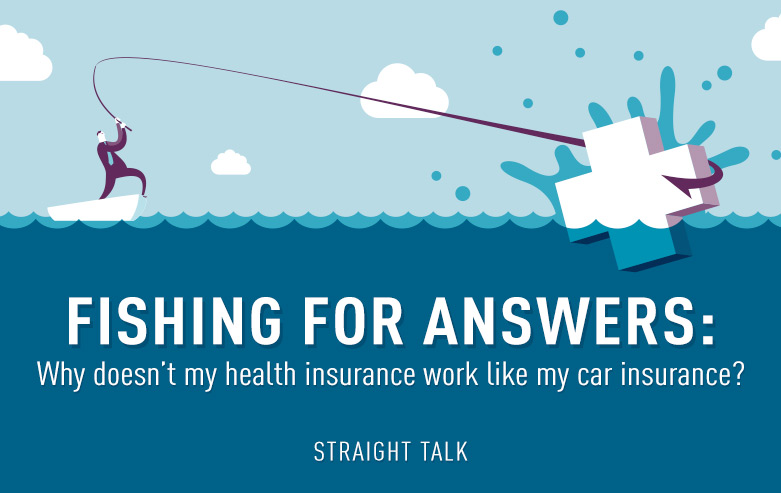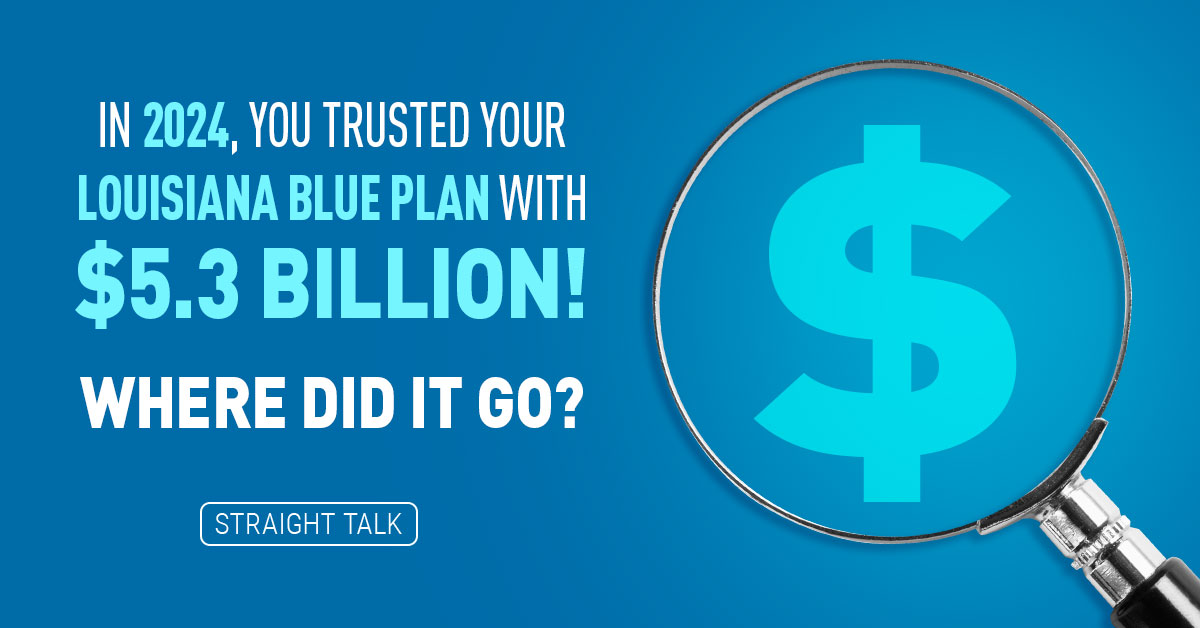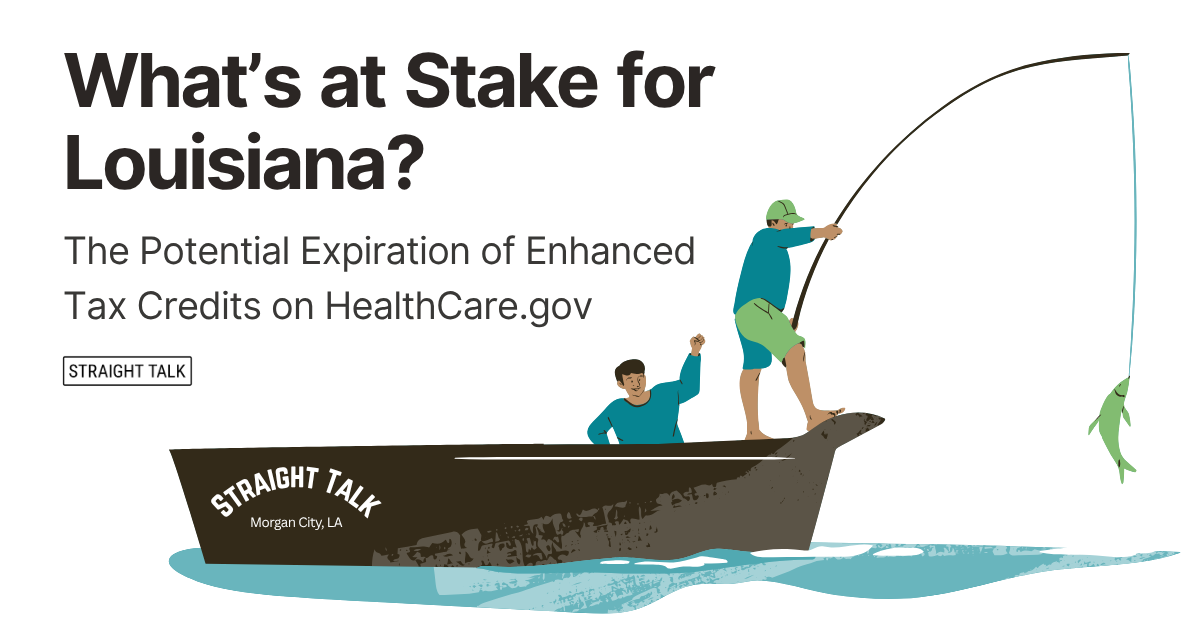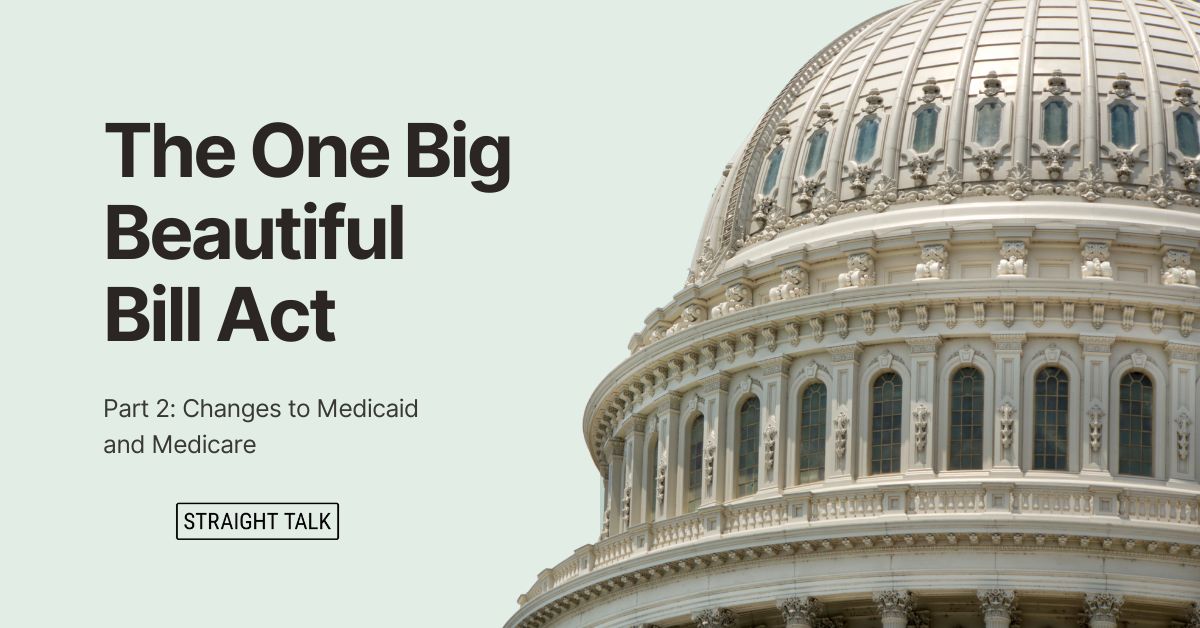It’s a beautiful day for fishing, and my old friend Ken (a very successful engineer in his mid-50s who just finished absorbing the cost of putting his two kids through college) and I are taking advantage of it. We usually talk shop a bit because we don’t see each other very often. This time, the conversation turns to insurance. Ken drops a pretty cast, turns to me and opens with this shot across my bow:
“Gee Mike, I don’t really get it. I mean, I have insurance on my car, and if I do the right thing, drive safely and don’t drive impaired, drive at a reasonable speed, drive fewer miles, then the insurance company sees me as a better risk and my rates go DOWN. If I get married or get older, my rates go down. If I move to a state with better liability laws or safer drivers, my rates go DOWN. If I drive a cheaper or safer car, my rates go down. As my car gets older, they go down.”
“I know what to do to help control my costs on car insurance and it all makes sense,” he said as I nodded vigorously, waiting for my opening. (Ken is the ultimate Straight Talker!) “But what the HECK do I do to get my HEALTH insurance rates down? I never use it, and they go up no matter what!” Ken finished, thoroughly exasperated. I smiled, nodded, drew a deep breath and began…
“Well, your car insurance company is allowed to adjust a lot of things based on who you are, your geography and your behavior before they set their rates,” I told him. “Car insurance rates can also change based also on your CREDIT rating! Turns out people with higher credit scores are less likely to be in crashes.”
“But the real problem is,” I continued, “individual health insurance has been FEDERALIZED and car insurance has not. So most car insurance companies can turn people away and not sell them insurance at all. Health insurance carriers have to take everyone who shows up, and by law, rates can’t be adjusted except for their ages.”
“So you see Ken, when insurance companies sell you health insurance in 2016, all the risk levers are gone, taken away, made illegal. We can’t adjust the rates we charge based on behavioral factors (except to punish you if you are foolish enough to self-report tobacco use) and we can’t turn anyone away.”
“So, buddy, imagine if your car insurance company had to take every driver in the world – good or bad. No adjustments for wrecks, DUIs, marital status, bad credit, expensive cars or anything like that. Imagine if all the bad driving risk in the world got dumped into YOUR car insurance company’s risk pool. Then imagine if your car insurance had to pay for all your oil changes and tune-ups, as well as when you actually have damage. What do you think would happen to your rates?”
Ken mused for about five seconds, caught the beer I sent his way and said, “Well, sure they’d go up, but with all the competition in car insurance, I’d just switch companies!”
He popped the beer, and I countered, “Well, what if ALL the companies had to follow the exact same rules, by federal law? What if lower-income drivers got federal assistance to pay 70 or 80% of their car insurance premiums with your tax dollars? And what if the police allowed 27 exemptions to the rule that says you HAVE to have car insurance to drive, watering it down so much that nobody followed it? How would your rates change then?”
“Madness!” Ken shot back at me, holding up a sandwich in a ‘you want one?’ attitude “No congressman or senator would ever allow that to happen!”
“But in health insurance, they already did,” I finished, accepting his offer of ice cold bologna, mayo and cheese. “That’s the net effect of the Patient Protection and Affordable Care Act to people who ALREADY had individual health insurance and could afford it before Jan. 1, 2014. People like you have been pushed aside to help poorer and sicker folks get healthcare coverage whether you like it or not.”
“But in our state today,” Ken said, taking a sip of his beer, clearly not ready to admit defeat, “really bad drivers have to have insurance just like everyone else, so they buy it from a state-run high risk pool and it covers the minimum amount of coverage the state requires and doesn’t affect me. Why can’t health insurance do the same thing?”
“Such a good point,” I smiled at him, feeling his pain and confusion. Through my mouthful of food I said, “We used to have that. They were even called high-risk pools in health insurance, too, and they were funded separately from your premiums so that very sick folks who couldn’t get insurance at work, or through a government program, would have access to insurance and their huge expenses wouldn’t get mixed in with everyone else’s rates. But the healthcare law killed those pools in favor of moving everyone back into the big risk pool that we all share. It was supposed to be cheaper to do it that way, but not, of course, for people like you who already had insurance that you were happy with.”
Ken dropped a perfect cast into place on the first try — he’s nothing if not persistent — and said, “but I read today that a bunch of health insurance companies, including yours, are about to raise rates AGAIN, a ton, like 25 or 30%! You’ve been doing this Obamacare thing for three years; haven’t you figured it out yet?”
“Yeah, we’ve been working on balancing this thing for going on our third year now, and it’s a huge battle,” I said, taking off my hat to wipe the sweat from underneath. I squinted into the sun and picked out my next casting target. “Nobody seems to have the right crystal ball and the new people we are insuring now are using healthcare at a rate NOBODY imagined. Imagine if half the people in your car insurance risk pool starting having wrecks once a month, and the company couldn’t drop them. What would happen to your rates then? That’s essentially what we’re dealing with right now.”
Ken looked up into the bright sky, doffed his hat and let the breeze blow through his hair “I’d open a body shop!” the always pragmatic engineer told me strongly. “It would be the best way to get rich at that point!”
“Smart move!” I agreed. “But our healthcare system already got that memo. While every other part of the economy bled jobs from 2000 to 2015 (-2% overall) healthcare went up 25% and is projected to be at 18 million jobs by 2020, growing from 9% of the workforce to over 15% in the next few years. Body shops indeed!” I finished, hoping I hadn’t totally ruined his day and trying one more cast into a particularly inviting spot.
“Well, now I am depressed” Ken finally admitted, reeling in his shiny gold spoon, “What would it take to stabilize this market so rates can flatten out? The new market, I mean, with all the bad drivers in it?”
I thought for a minute, took a big sip and let the cold brew wash down my throat. “We definitely need some help. The key to a stable risk pool pricing is diversity and fairness. Unfortunately there are a ton of young folks who are not joining the party or buying coverage, because their premiums are much too high so that 50-64-year-olds can get a break on theirs.”
“Can you imagine that people at the peak of their earning potential are being subsidized by your kids and my kids just getting into their first jobs?” I asked. “That’s exactly what’s happening because of the way the Feds say you have to divvy up the premiums. Also, the law that says you get fined if you don’t have health insurance now has 27 different exemptions to it. It’s essentially unenforceable now.”
I paused, reeled in my double rig and put on some fresh, smelly squid. SO smelly! “Plus people are smart; they’ve figured out the Fed is not checking on special enrollment, so they can wait until they get sick to sign up. Then they just keep the coverage just long enough to get well and then drop it. Imagine if you only bought car insurance AFTER you had a wreck, then you dropped it after they fixed your car! Why would you have it all the time? And how much would it cost then?”
I saw his grimace, even as he was paying attention to a slight bobbing on his rod tip…
Time for the big finish, I thought, feeling a slight tug on my line. I reeled the line in a bit and lowered the rod tip. “What’s really scary,” I explained, “is the Feds told insurance companies to price as low as they could because they agreed to cover big losses if the new population got too sick. And then, of course, a new Congress came in and shut down the payments after the fact, so we got stuck holding the bag.”
“But they didn’t shut down all the new taxes and fees the healthcare law added that have to be paid through your premiums,” I continued. “My relatively small Blue plan has lost $200 million dollars just since Jan. 1, 2014, trying to help these folks get healthcare and paid about $100 million in brand new federal taxes. We can’t do that forever.”
“So what exactly are you going to do about all that?” Ken asked, watching my rod tip dip a bit just as his line started getting tighter.
“I’m going to tell everyone I meet to try to make sure they know what’s going on, talk about the solutions and what it will take to stabilize the market, and pray that someone in power finally gets it together and pays attention. If not, a lot of insurance companies are going to disappear from the www.healthcare.gov markets and people who need insurance won’t be able to get it” I finished quietly.
“Well, keep on brother. I’m sure somebody will listen to you. You can be pretty persuasive,” he said with a smile. And then his rod tip dipped really hard, I felt a good yank on my pole at the same time, we smiled and both jumped up to set the hooks, started reeling like crazy, and our problems just melted away.





The bit at the end where they snag each other’s lines was funny.